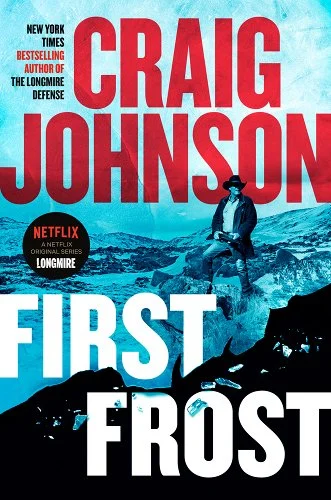First Frost by Craig Johnson
A return to Walt and Henry’s youth shows the veteran reader of the Longmire series how and why they came to be the men they are. Younger, perhaps less wise but still with all the traits that have made them favorites, this story will fully satisfy any reader of the author’s works.
Both the latest and earliest of the Walt Longmire tales from erstwhile novelist Craig Johnson satisfies the enthusiastic reader of the author’s works fully and with gusto. Returning to the genesis of Walt’s career as an investigator of crime and a champion of justice, this lively account of a simpler but equally fraught time is filled with trademark humor, suspense, violence and the perseverance (read stubbornness) of the Wyoming sheriff readers have come to love. As an aside, those with collections of the complete Johnson works will notice that as the series has matured, the publisher has altered the covers several times, each alteration emphasizing the writer’s name until, in the last half-dozen, the words “Craig Johnson” now occupy the first-seen upper portion of the cover and nearly the entirety of the spine, making it the obvious object of appeal. Publishers, whatever else they may be, know upon which side their bread is buttered. To Longmire fans, title is secondary, author is primary.
After leaving university and their football careers, Walt and Henry Standing Bear have enlisted in the military to avoid being drafted, a strategy to control, to whatever degree possible, their placement in the armed forces and to fulfill their obligations to the nation. At times they question the wisdom of voluntarily placing themselves in peril but are ultimately confident that they are doing the right thing, as dangerous as it may be. As it turns out they needn’t go to Vietnam to face life-threating danger but find it right at home in a dusty, nearly deserted Arizona town next to an abandoned Japanese resettlement camp left over from WWII.
There is a supernatural aspect to their adventures, legend, mythos and the presence of spirits being a part of nearly every Longmire adventure. Between Walt’s down-home, aw-shucks honesty and Henry’s laconic and somewhat cynical take of life, they become entangled in a decades-old mystery. The murder of a group of U.S. citizens of Japanese ancestry by a bigoted mob has been muffled for years, but the wound remains open and memories are fresh. The violence persists, with more murders and physical attacks keeping the fires burning.
As always, the cerebral aspects of investigating hold a place immediately adjacent to the two-fisted brawling side of our heroes, never at their instigation, but always to the sorrow of anyone seeking to push them too far. Walt and Henry are dangerous men, not given to starting trouble but never backing away from it. Longtime fans of their exploits will not be disappointed, and the dry and often intellectual humor common to all of Johnson’s works is delightfully present.



